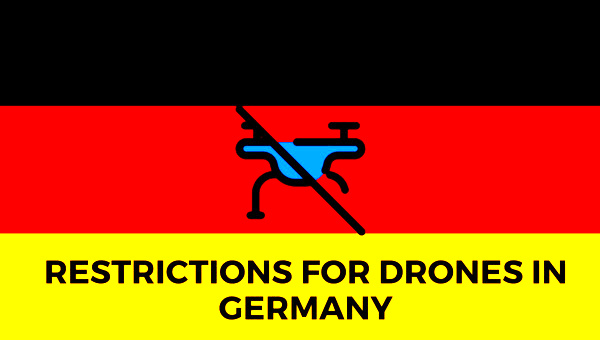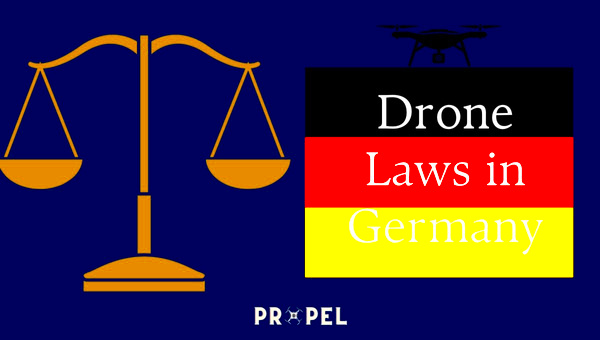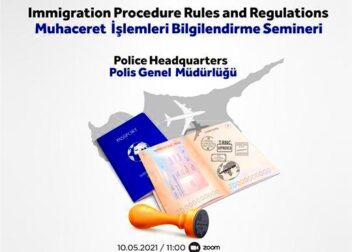Drone Laws in Germany and Navigating Airspace Regulations
Drone technology is evolving rapidly, and so are the laws that govern their use. In Germany, regulations are designed to ensure safety and privacy while allowing for the growth of this exciting industry. Understanding these laws is crucial for anyone who wants to operate a drone in German airspace. Whether you’re a hobbyist or a professional, being aware of the legal landscape helps you fly responsibly and avoid penalties.
Types of Drones and Their Classifications

In Germany, drones are classified into different categories based on their weight and intended use. Here’s a quick breakdown:
- Micro Drones: Weighing less than 250 grams, these drones can be flown without a license and are often used for recreational purposes.
- Small Drones: Ranging from 250 grams to 2 kilograms, these require a basic registration and operators must pass a competency test.
- Large Drones: Weighing over 2 kilograms, these require more stringent licensing and are subject to stricter regulations.
Each category has specific rules regarding where and how they can be flown. Knowing your drone’s classification is essential for compliance with the law.
Licensing and Registration Requirements for Drone Operators
Before you take to the skies, it’s important to understand the licensing and registration requirements for drone operators in Germany. Here’s what you need to know:
- Registration: All drones over 250 grams must be registered with the Luftfahrt-Bundesamt (LBA). You’ll receive a unique identification number to place on your drone.
- Competency Test: For small drones (250g to 2kg), operators must pass an online test covering basic aviation knowledge and safety regulations.
- License: If you plan to fly large drones (over 2kg), you need a pilot’s license, which requires more comprehensive training and testing.
These measures are in place to promote safe flying and ensure that drone operators are aware of their responsibilities. By fulfilling these requirements, you not only comply with the law but also contribute to safer airspace for everyone.
General Airspace Regulations for Drones
When flying a drone in Germany, it’s essential to understand the general airspace regulations that apply. These rules help ensure the safety of both drone operators and other airspace users. Here are some key points to keep in mind:
- Maximum Altitude: Drones are generally allowed to fly up to 120 meters (about 394 feet) above ground level. This limit helps prevent conflicts with manned aircraft.
- Visual Line of Sight: Operators must always maintain a visual line of sight with their drone. This means you should be able to see your drone at all times while it’s in the air.
- Prohibited Areas: Certain areas are off-limits for drone flights, such as military zones, nature reserves, and other sensitive locations. Always check local maps and guidelines before flying.
- Insurance Requirement: Liability insurance is mandatory for drone operators in Germany. This ensures that you are covered in case of accidents or damage caused by your drone.
By following these general airspace regulations, you can help ensure a safer flying experience for yourself and others.
Specific Restrictions in Urban Areas
Flying drones in urban areas comes with its own set of challenges and restrictions. The dense population and numerous buildings increase the risk of accidents, which is why special rules are in place. Here are the main considerations:
- Flight Bans: In many cities, there are complete flight bans over populated areas. Always check local laws before planning a flight in urban settings.
- Height Restrictions: Some urban areas have stricter altitude limits. Drones may be limited to flying at lower altitudes, especially near buildings and crowds.
- Privacy Considerations: Be mindful of people’s privacy. Avoid flying over private properties or capturing images of individuals without their consent.
- Emergency Zones: Keep away from emergency services and their operations. Flying near hospitals, fire stations, and police activities can obstruct essential services.
By adhering to these specific restrictions, you can help keep urban areas safe and enjoyable for everyone.
Rules for Flying Drones Near Airports
When it comes to flying drones near airports, safety is paramount. Air traffic control needs to manage manned aircraft effectively, which is why strict regulations apply. Here’s what you need to know:
- Prohibited Zones: Drones are completely prohibited from flying within a certain radius of airports. This usually extends to about 5 kilometers (approximately 3 miles) from the airport perimeter.
- Notification Requirements: If you plan to operate a drone near controlled airspace, you must notify the air traffic control at the relevant airport. They can provide guidance on safe flying practices.
- Altitude Restrictions: Even in areas outside the immediate airport vicinity, there may be altitude restrictions for drone flights. Always check local regulations to ensure compliance.
- Awareness of Aircraft: Always remain vigilant for manned aircraft in the vicinity. If you see an aircraft approaching, safely land your drone immediately.
Following these rules helps ensure that drone operations do not interfere with manned flights, making air travel safer for everyone.
Privacy Considerations and Data Protection Laws
When flying drones in Germany, it’s crucial to be aware of privacy considerations and data protection laws. With the ability to capture images and videos from the sky, drones can inadvertently invade people’s privacy. Here are some key points to keep in mind:
- General Data Protection Regulation (GDPR): Germany follows strict GDPR rules, which apply to drone operators capturing personal data. This means you must ensure that any images or videos taken do not violate individuals’ privacy rights.
- Obtaining Consent: If you’re filming or photographing individuals in public spaces, it’s best practice to seek their consent. This can help avoid potential conflicts and legal issues.
- Limitations on Data Use: Personal data collected through drone footage must only be used for the specific purpose stated at the time of collection. Avoid using the data for commercial purposes unless you have the proper permissions.
- Privacy Zones: Be aware of private properties and restricted areas where capturing footage could violate privacy rights. Always respect “no-fly” zones and private property lines.
By following these privacy considerations and data protection laws, you can help ensure a respectful and lawful flying experience while operating your drone.
Enforcement and Penalties for Violating Drone Laws
Understanding the enforcement measures and potential penalties for violating drone laws in Germany is essential for all operators. The authorities take these regulations seriously, and there are consequences for non-compliance. Here’s what you need to know:
- Monitoring and Inspections: Local authorities and police actively monitor drone activity. They can conduct inspections to ensure compliance with regulations.
- Fines: Violating drone laws can result in significant fines. For instance, flying in restricted areas can lead to fines of several hundred euros.
- Seizure of Equipment: In some cases, authorities may confiscate drones that are being operated illegally, especially if they pose a danger to others.
- Criminal Charges: Serious violations, such as endangering manned aircraft or breaching privacy laws, can lead to criminal charges. This could result in a criminal record and even imprisonment in extreme cases.
To avoid penalties, it’s crucial to stay informed about current regulations and fly your drone responsibly.
Frequently Asked Questions about Drone Laws in Germany
Many people have questions about drone laws in Germany. Here are some frequently asked questions that can help clarify common concerns:
- Do I need a license to fly a drone? Yes, a license is required for drones weighing over 250 grams. You must register your drone and pass a competency test if it falls within the small drone category.
- Can I fly my drone in any area? No, there are specific restrictions, especially near airports, military zones, and populated areas. Always check local regulations before flying.
- What are the penalties for flying without a license? Operating a drone without the necessary licenses can result in hefty fines, confiscation of your drone, or even criminal charges.
- How can I ensure I am flying legally? Familiarize yourself with local regulations, stay updated on airspace changes, and always maintain a visual line of sight with your drone.
By addressing these common questions, you can be better prepared to navigate the complexities of drone laws in Germany.
Conclusion on Navigating Drone Regulations
Navigating drone regulations in Germany can seem overwhelming at first, but understanding the key rules and requirements can make the process much simpler. By staying informed about airspace regulations, licensing, privacy laws, and enforcement measures, you can ensure a safe and enjoyable flying experience. Always remember to respect others’ privacy and comply with local laws to foster a responsible drone community. Whether you’re a hobbyist or a professional operator, following these guidelines not only protects you from potential penalties but also contributes to a safer airspace for everyone.


